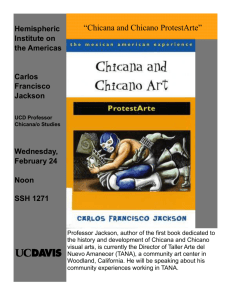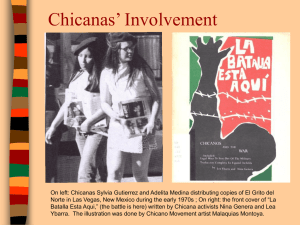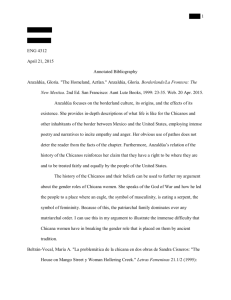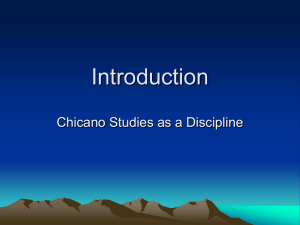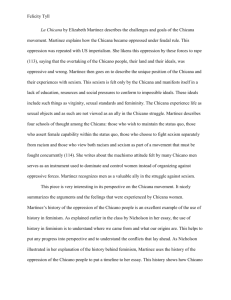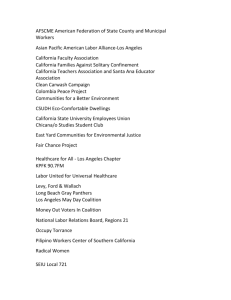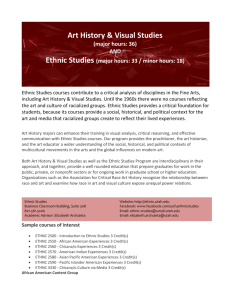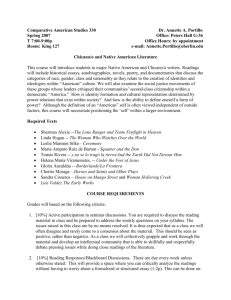UC Davis 2014-2016 General Catalog
advertisement
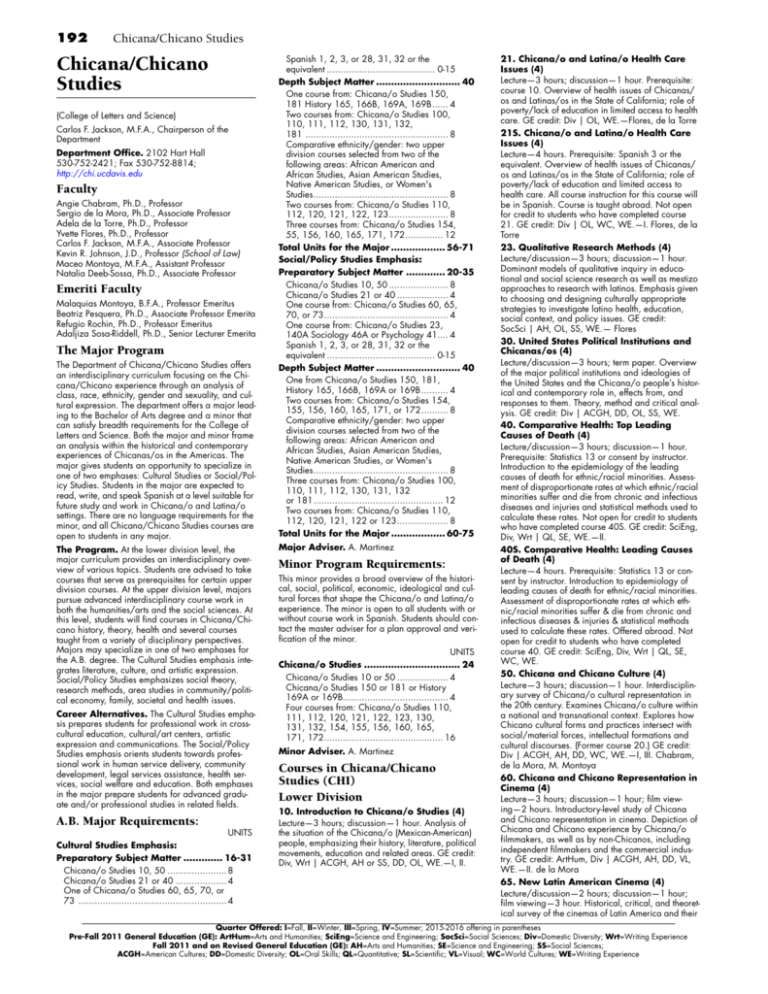
192 Chicana/Chicano Studies Chicana/Chicano Studies (College of Letters and Science) Carlos F. Jackson, M.F.A., Chairperson of the Department Department Office. 2102 Hart Hall 530-752-2421; Fax 530-752-8814; http://chi.ucdavis.edu Faculty Angie Chabram, Ph.D., Professor Sergio de la Mora, Ph.D., Associate Professor Adela de la Torre, Ph.D., Professor Yvette Flores, Ph.D., Professor Carlos F. Jackson, M.F.A., Associate Professor Kevin R. Johnson, J.D., Professor (School of Law) Maceo Montoya, M.F.A., Assistant Professor Natalia Deeb-Sossa, Ph.D., Associate Professor Emeriti Faculty Malaquias Montoya, B.F.A., Professor Emeritus Beatriz Pesquera, Ph.D., Associate Professor Emerita Refugio Rochin, Ph.D., Professor Emeritus Adaljiza Sosa-Riddell, Ph.D., Senior Lecturer Emerita The Major Program The Department of Chicana/Chicano Studies offers an interdisciplinary curriculum focusing on the Chicana/Chicano experience through an analysis of class, race, ethnicity, gender and sexuality, and cultural expression. The department offers a major leading to the Bachelor of Arts degree and a minor that can satisfy breadth requirements for the College of Letters and Science. Both the major and minor frame an analysis within the historical and contemporary experiences of Chicanas/os in the Americas. The major gives students an opportunity to specialize in one of two emphases: Cultural Studies or Social/Policy Studies. Students in the major are expected to read, write, and speak Spanish at a level suitable for future study and work in Chicana/o and Latina/o settings. There are no language requirements for the minor, and all Chicana/Chicano Studies courses are open to students in any major. The Program. At the lower division level, the major curriculum provides an interdisciplinary overview of various topics. Students are advised to take courses that serve as prerequisites for certain upper division courses. At the upper division level, majors pursue advanced interdisciplinary course work in both the humanities/arts and the social sciences. At this level, students will find courses in Chicana/Chicano history, theory, health and several courses taught from a variety of disciplinary perspectives. Majors may specialize in one of two emphases for the A.B. degree. The Cultural Studies emphasis integrates literature, culture, and artistic expression. Social/Policy Studies emphasizes social theory, research methods, area studies in community/political economy, family, societal and health issues. Career Alternatives. The Cultural Studies emphasis prepares students for professional work in crosscultural education, cultural/art centers, artistic expression and communications. The Social/Policy Studies emphasis orients students towards professional work in human service delivery, community development, legal services assistance, health services, social welfare and education. Both emphases in the major prepare students for advanced graduate and/or professional studies in related fields. A.B. Major Requirements: UNITS Cultural Studies Emphasis: Preparatory Subject Matter ............. 16-31 Chicana/o Studies 10, 50 ...................... 8 Chicana/o Studies 21 or 40 ................... 4 One of Chicana/o Studies 60, 65, 70, or 73 ....................................................... 4 Spanish 1, 2, 3, or 28, 31, 32 or the equivalent ........................................ 0-15 Depth Subject Matter ............................ 40 One course from: Chicana/o Studies 150, 181 History 165, 166B, 169A, 169B...... 4 Two courses from: Chicana/o Studies 100, 110, 111, 112, 130, 131, 132, 181 ..................................................... 8 Comparative ethnicity/gender: two upper division courses selected from two of the following areas: African American and African Studies, Asian American Studies, Native American Studies, or Women's Studies.................................................. 8 Two courses from: Chicana/o Studies 110, 112, 120, 121, 122, 123...................... 8 Three courses from: Chicana/o Studies 154, 55, 156, 160, 165, 171, 172.............. 12 Total Units for the Major .................. 56-71 Social/Policy Studies Emphasis: Preparatory Subject Matter ............. 20-35 Chicana/o Studies 10, 50 ...................... 8 Chicana/o Studies 21 or 40 ................... 4 One course from: Chicana/o Studies 60, 65, 70, or 73.............................................. 4 One course from: Chicana/o Studies 23, 140A Sociology 46A or Psychology 41.... 4 Spanish 1, 2, 3, or 28, 31, 32 or the equivalent ........................................ 0-15 Depth Subject Matter ............................ 40 One from Chicana/o Studies 150, 181, History 165, 166B, 169A or 169B.......... 4 Two courses from: Chicana/o Studies 154, 155, 156, 160, 165, 171, or 172.......... 8 Comparative ethnicity/gender: two upper division courses selected from two of the following areas: African American and African Studies, Asian American Studies, Native American Studies, or Women's Studies.................................................. 8 Three courses from: Chicana/o Studies 100, 110, 111, 112, 130, 131, 132 or 181................................................ 12 Two courses from: Chicana/o Studies 110, 112, 120, 121, 122 or 123................... 8 Total Units for the Major .................. 60-75 Major Adviser. A. Martinez Minor Program Requirements: This minor provides a broad overview of the historical, social, political, economic, ideological and cultural forces that shape the Chicana/o and Latina/o experience. The minor is open to all students with or without course work in Spanish. Students should contact the master adviser for a plan approval and verification of the minor. UNITS Chicana/o Studies ................................ 24 Chicana/o Studies 10 or 50 ................... 4 Chicana/o Studies 150 or 181 or History 169A or 169B....................................... 4 Four courses from: Chicana/o Studies 110, 111, 112, 120, 121, 122, 123, 130, 131, 132, 154, 155, 156, 160, 165, 171, 172............................................ 16 Minor Adviser. A. Martinez Courses in Chicana/Chicano Studies (CHI) Lower Division 10. Introduction to Chicana/o Studies (4) Lecture—3 hours; discussion—1 hour. Analysis of the situation of the Chicana/o (Mexican-American) people, emphasizing their history, literature, political movements, education and related areas. GE credit: Div, Wrt | ACGH, AH or SS, DD, OL, WE.—I, II. 21. Chicana/o and Latina/o Health Care Issues (4) Lecture—3 hours; discussion—1 hour. Prerequisite: course 10. Overview of health issues of Chicanas/ os and Latinas/os in the State of California; role of poverty/lack of education in limited access to health care. GE credit: Div | OL, WE.—Flores, de la Torre 21S. Chicana/o and Latina/o Health Care Issues (4) Lecture—4 hours. Prerequisite: Spanish 3 or the equivalent. Overview of health issues of Chicanas/ os and Latinas/os in the State of California; role of poverty/lack of education and limited access to health care. All course instruction for this course will be in Spanish. Course is taught abroad. Not open for credit to students who have completed course 21. GE credit: Div | OL, WC, WE.—I. Flores, de la Torre 23. Qualitative Research Methods (4) Lecture/discussion—3 hours; discussion—1 hour. Dominant models of qualitative inquiry in educational and social science research as well as mestizo approaches to research with latinos. Emphasis given to choosing and designing culturally appropriate strategies to investigate latino health, education, social context, and policy issues. GE credit: SocSci | AH, OL, SS, WE.— Flores 30. United States Political Institutions and Chicanas/os (4) Lecture/discussion—3 hours; term paper. Overview of the major political institutions and ideologies of the United States and the Chicana/o people’s historical and contemporary role in, effects from, and responses to them. Theory, method and critical analysis. GE credit: Div | ACGH, DD, OL, SS, WE. 40. Comparative Health: Top Leading Causes of Death (4) Lecture/discussion—3 hours; discussion—1 hour. Prerequisite: Statistics 13 or consent by instructor. Introduction to the epidemiology of the leading causes of death for ethnic/racial minorities. Assessment of disproportionate rates at which ethnic/racial minorities suffer and die from chronic and infectious diseases and injuries and statistical methods used to calculate these rates. Not open for credit to students who have completed course 40S. GE credit: SciEng, Div, Wrt | QL, SE, WE.—II. 40S. Comparative Health: Leading Causes of Death (4) Lecture—4 hours. Prerequisite: Statistics 13 or consent by instructor. Introduction to epidemiology of leading causes of death for ethnic/racial minorities. Assessment of disproportionate rates at which ethnic/racial minorities suffer & die from chronic and infectious diseases & injuries & statistical methods used to calculate these rates. Offered abroad. Not open for credit to students who have completed course 40. GE credit: SciEng, Div, Wrt | QL, SE, WC, WE. 50. Chicana and Chicano Culture (4) Lecture—3 hours; discussion—1 hour. Interdisciplinary survey of Chicana/o cultural representation in the 20th century. Examines Chicana/o culture within a national and transnational context. Explores how Chicano cultural forms and practices intersect with social/material forces, intellectual formations and cultural discourses. (Former course 20.) GE credit: Div | ACGH, AH, DD, WC, WE.—I, III. Chabram, de la Mora, M. Montoya 60. Chicana and Chicano Representation in Cinema (4) Lecture—3 hours; discussion—1 hour; film viewing—2 hours. Introductory-level study of Chicana and Chicano representation in cinema. Depiction of Chicana and Chicano experience by Chicana/o filmmakers, as well as by non-Chicanos, including independent filmmakers and the commercial industry. GE credit: ArtHum, Div | ACGH, AH, DD, VL, WE.—II. de la Mora 65. New Latin American Cinema (4) Lecture/discussion—2 hours; discussion—1 hour; film viewing—3 hour. Historical, critical, and theoretical survey of the cinemas of Latin America and their Quarter Offered: I=Fall, II=Winter, III=Spring, IV=Summer; 2015-2016 offering in parentheses Pre-Fall 2011 General Education (GE): ArtHum=Arts and Humanities; SciEng=Science and Engineering; SocSci=Social Sciences; Div=Domestic Diversity; Wrt=Writing Experience Fall 2011 and on Revised General Education (GE): AH=Arts and Humanities; SE=Science and Engineering; SS=Social Sciences; ACGH=American Cultures; DD=Domestic Diversity; OL=Oral Skills; QL=Quantitative; SL=Scientific; VL=Visual; WC=World Cultures; WE=Writing Experience Chicana/Chicano Studies relationship to the emergence of U.S. Latino cinema. Emphasis on representation and social identity including gender, sexuality, class, race and ethnicity. GE credit: ArtHum, Div | AH, VL, WC, WE.—de la Mora 70. Survey of Chicana/o Art (4) Lecture—4 hours. Survey of contemporary Chicana/o art in context of the social turmoil from which it springs. Includes political use of the poster and the mural, the influence of the Mexican mural and graphic movement, and social responsibility of the artist. GE credit: Div | ACGH, AH, DD, VL, WC, WE.—I. Jackson, M. Montoya 73. Chicana/o Art Expression Through Silk Screen (4) Studio—8 hours; laboratory—4 hours. Introductory level studio course using silk screen and basic printing techniques to explore and develop images of Chicana/o cultural themes and expressions. Students will experiment with images and symbols from their immediate environment/culture. Integrated approach to Chicana/o philosophy of art. GE credit: ACGH, AH, DD, OL, VL, WC.—I. Jackson 92. Internship (1-12) Internship—3-36 hours. Prerequisite: course 10 or consent of instructor. Academic guidance combined with internship in community agencies serving Mexican/Latina/Latino/Chicana/Chicano clients. Use of bilingual skills and knowledge of history, culture, economics, politics and social issues. May be repeated for credit up to 12 units. (P/NP grading only.) 98. Directed Group Study (1-5) (P/NP grading only.) 99. Special Study for Undergraduates (1-5) (P/NP grading only.) Upper Division 100. Chicana/Chicano Theoretical Perspective (4) Lecture/discussion—3 hours; term paper. Prerequisite: courses 10 and 50. Critical examination of emerging Chicana/o Studies theoretical perspectives in light of contemporary intellectual frameworks in the social sciences, arts, and humanities. Includes analysis of practices of self-representation, and socio-cultural developments in the Chicana/o community. GE credit: ACGH, DD, SS, WC, WE.—III. Chabram, Deeb-Sossa 110. Sociology of the Chicana/o Experience (4) Lecture/discussion—4 hours. Prerequisite: course 10 or Sociology 1. The Chicana/o experience in the American society and economy viewed from theoretical perspectives. Immigration, history of integration of Chicana/o labor into American class structure, education inequality, ethnicity, the family and Chicana/o politics. (Former course Sociology 110.) GE credit: SocSci, Div, Wrt | ACGH, DD, OL, SS, WE.—III. Deeb-Sossa 111. Chicanas/Mexicanas in Contemporary Society (4) Lecture/discussion—4 hours. Prerequisite: course 10 or 50, Women’s Studies 50 or History 169B. Analysis of the role and status of Chicanas/Mexicanas in contemporary society. Special emphasis on their historical role, the political, economic and social institutions that have affected their status, and their contributions to society and their community. (Former course 102.) GE credit: ArtHum | ACGH, DD, SS, WE.—Deeb-Sossa 112. Globalization, Transnational Migration, and Chicana/o and Latina/o Communities (4) Lecture—4 hours. Prerequisite: course 10. Chicana/ o and Latina/o migration experiences within a global context. Topics include national and/or transnational migration in Mexico, Central America, and the United States. GE credit: SocSci, Div, Wrt | ACGH, DD, OL, SS, WE. 113. Latin American Women’s Engagement in Social Movements (4) Lecture/discussion—3 hours; term paper. Examination of how women of different racial/ethnic and class backgrounds in Latin America challenge their marginalization. Exploration of US foreign policy, its effects on Latin American’s institutions and on Latin American citizens. Using Chicana feminist perspective. Offered in alternate years. GE credit: SocSci | ACGH, DD, SS, WC, WE.—Deeb-Sossa 114. Women of Color Reproductive Health and Reproductive Politics in a Global Perspective (4) Lecture/discussion—3 hours; term paper. Study contemporary issues in reproductive health and reproductive politics, both globally and in the U.S., for women of color. Offered in alternate years. GE credit: SocSci | ACGH, DD, SS, WC, WE.—DeebSossa 120. Chicana/o Psychology (4) Lecture—3 hours; discussion—1 hour. Prerequisite: course 21; introductory psychology course recommended. Introduction to the field of Chicana/o psychology. Analysis of socio-cultural context of Chicanas/os and Latinas/os. Special attention to issues of ethnic identity development, bilingualism, and development of self esteem. Impact of minority experience, migration, acculturation are examined. GE credit: SocSci, Div | ACGH, DD, OL, SS, WE.— Flores 121. Chicana/o Community Mental Health (4) Lecture—3 hours; term paper. Prerequisite: course 10 or 20. Mental health needs, problems, and service utilization patterns of Chicanas/os and Latinas/ os will be analyzed. An analysis of social service policy, and the economic context of mental health programs. Offered Alternate Years. GE credit: SocSci, Div, Wrt | ACGH, DD, OL, SS, WE.—Flores 122. Psychology Perspectives Chicana/o and Latina/o Family (4) Lecture—4 hours. Prerequisite: course 10; introductory psychology course highly recommended, and/ or consent of instructor. Role of migration and acculturation on family structure and functioning. From a psychological and Chicana/o Studies perspective, contemporary gender roles and variations in family structures are examined. Special topics include family violence, addiction, family resilience and coping strategies. GE credit: SS, WE.—I. Flores 122S. Psychology Perspectives Chicana/o and Latina/o Family (4) Lecture—4 hours. Role of migration and acculturation on family structure and functioning. From a psychological and Chicana/o Studies perspective, contemporary gender roles and variations in family structures are examined. Special topics include family violence, addiction, family resilience and coping strategies. This course is taught abroad. Not open for credit to students who have completed course 122. GE credit: OL, SS, WC, WE.—Flores 123. Psychological Perspectives on Chicana/o and Latina/o Children and Adolescents (4) Lecture—3 hours; term paper. Prerequisite: course 10 or 21, and upper division standing. Psychological and educational development of Chicano/Latino children and adolescents, with particular attention to the formation of ethnic, gender, class, race, and sexual identities. GE credit: SocSci, Div, Wrt | ACGH, DD, OL, SS, WE.—Flores 125S. Latino Families in the Age of Globalization: Migration and Transculturation (4) Lecture/discussion—4 hours. Prerequisite: Spanish 3 or equivalent highly recommended. Impact of globalization on Latino families in the American continent. Relationships of political structure, economics and family. Intimate partner violence, child maltreatment and alcohol/drug abuse in contemporary Latino families. Offered in a Spanish speaking country. 125S GE credit: OL, SS, WC, WE.—Flores 193 130. United States-Mexican Border Relations (4) Lecture—3 hours; term paper. Prerequisite: upper division standing. Theories of U.S.-Mexican border relations, with an overview of the political, economic, and social relationships and an in-depth analysis of immigration issues, border industrialization, women’s organizations, economic crises, and legal issues. GE credit: Div | ACGH, DD, SS, WE.—I. Chabram, de la Torre 131. Chicanas in Politics and Public Policy (4) Lecture/discussion—4 hours. Prerequisite: course 30 or Political Science 1. Historical and political analysis of Chicana/Latina political involvement and activities in the general political system, women’s movement, Chicano movement, and Chicana movement. Course also examines the public policy process and the relationship of Chicanas/Latinas to public policy formation. Offered in alternate years. GE credit: SocSci, Div | ACGH, DD, OL, SS, WE. 131S. Chicanas in Politics and Public Policy (4) Lecture/discussion—4 hours. Historical and political analysis of Chican/Latina political involvement and activities in the general political system, women's movement, Chicano/a movement. Course also examines the public policy process and the relationship of Chicanas/Latinas to public policy formation. Offered abroad. Not open for credit to students who have completed course 131. GE credit: SocSci, Div | OL, SS, WC, WE. 132. Political Economy of Chicana/o Communities (4) Lecture—3 hours; term paper. Prerequisite: upper division standing; lower division Chicana/o Studies course recommended. Historical and contemporary study of political and economic forces which define and influence the development of Chicana/o communities. Includes critiques of traditional and Marxian theories and concepts applicable to Chicana/o communities, case studies of Chicana/o communities, especially in California and Texas. GE credit: ACGH, DD, OL, WE.—III. 135S. Transnational Latina/o Political Economy (4) Lecture—3 hours; term paper. Prerequisite: Spanish 3 or equivalent, or consent of instructor; Economics 1A and 1B recommended. Intensive reading, discussion and research on selected topics from Latin America and the US with regard to immigrant and native communities. Topics include comparative immigration and macroeconomic policies in the US and Latin America. Offered in a Spanish speaking country. GE credit: OL, WC, WE. 140A. Quantitative Methods: Chicano/ Latino Health Research (4) Lecture—3 hours; discussion/laboratory—1 hour. Prerequisite: two years of high school algebra or the equivalent in college. Focuses on measuring Latino/ Chicano health outcomes using a quantitative approach. Assesses main types of study designs and addresses measurement of disease frequency and health effects. GE credit: SciEng | ACGH, DD, QL, SE. 145S. Bi-National Health (5) Lecture—5 hours. Prerequisite: Biological Sciences 1A-1B-1C, Spanish 21 or 31 or consent of instructor; upper division standing only. Examination of health status and intervention strategies presented in public health care settings, private clinics and by indigenous healers in Mexico. Analysis of impact of high risk diseases. Offered in a Spanish speaking country under supervision of UC Davis faculty/lecturer. GE credit: OL, WC, WE.—I. Flores, de la Torre 146S. Public Health in Latin America (5) Lecture/discussion—4 hours; term paper. Critical examination of emerging Public Health issues in Latin America in light of economic, political and social conditions. Contemporary behavioral frameworks used in public health. Includes analysis of clinical medicine and health care systems.—de la Torre Quarter Offered: I=Fall, II=Winter, III=Spring, IV=Summer; 2015-2016 offering in parentheses Pre-Fall 2011 General Education (GE): ArtHum=Arts and Humanities; SciEng=Science and Engineering; SocSci=Social Sciences; Div=Domestic Diversity; Wrt=Writing Experience Fall 2011 and on Revised General Education (GE): AH=Arts and Humanities; SE=Science and Engineering; SS=Social Sciences; ACGH=American Cultures; DD=Domestic Diversity; OL=Oral Skills; QL=Quantitative; SL=Scientific; VL=Visual; WC=World Cultures; WE=Writing Experience 194 Child Development (A Graduate Group) 147S. Indigenous Healing and Biodiversity in Latin America (5) Lecture—4 hours; term paper. Contrast between western and traditional healing practices in Latin America and the role of the natural environment in creating sustainable health delivery systems. Questions of health status attributable to public health and environmental risk factors. GE credit: OL, WC, WE.—I. de la Torre 150. The Chicana and Chicano Movement (4) Lecture—3 hours; term paper. Development of the Chicano Movement within the context of the sociopolitical movements of the 1960’s in a national and global perspective. Ideological/political perspectives and the implications for political strategies. GE credit: ArtHum, Div, Wrt | ACGH, AH or SS, DD, WC, WE.—II. 154. The Chicana/o Novel (4) Lecture—4 hours. Prerequisite: intermediate Spanish or consent of instructor. Introduction to the forms and themes of the Chicana/o novel with special attention to the construction of gender, nationality, sexuality, social class, and the family by contemporary Chicana/o novelists. Bilingual readings, lectures, discussions, and writing in Spanish. (Former course Spanish 126A.) GE credit: ArtHum, Div | ACGH, AH, DD, OL, WC, WE.—II. Chabram, M. Montoya 155. Chicana/o Theater (4) Lecture—4 hours. Prerequisite: intermediate Spanish or consent of instructor. Examination of the formal and thematic dimensions of Chicana/o theater in the contemporary period with special emphasis on El Teatro Campesino and Chicana Feminist Theater. Bilingual readings, lectures, discussions, and writing in Spanish. (Former course Spanish 126B.) GE credit: ACGH, AH, DD, OL, VL, WC, WE.— Chabram 156. Chicana/o Poetry (4) Lecture—4 hours. Prerequisite: intermediate Spanish or consent of instructor. Survey of Chicana/o poetry with special emphasis on its thematic and formal dimensions. Bilingual readings, lectures, discussions, and writing in Spanish. (Former course Spanish 126C.) GE credit: ACGH, AH, DD, OL, WC, WE.— III. Chabram 157. Chicana and Chicano Narrative (4) Lecture/discussion—3 hours; term paper. Exploration of contemporary forms of the Chicana and Chicano narrative, encompassing visual art, fiction, poetry, film, theater, and creative nonfiction. Exposure to a variety of artists and scholars whose work shapes our evolving understanding of the Chicana/ o experience. GE credit: ArtHum | ACGH, AH, DD, VL, WC. WE.—III. Montoya 160. Mexican Film and Greater Mexican Identity (4) Lecture/discussion—4 hours; film viewing—1 hour. Prerequisite: intermediate Spanish. Survey of the role Mexican cinema plays in consolidation and contestation of post-revolutionary Mexican state and in the formation of a greater Mexican cultural identity including Chicana/o identity. Showcases genres, periods, auteurs, movements, and emphasis on gendered and sexualized narratives. GE credit: ArtHum, Div | AH, VL, WC, WE.—de la Mora 165. Chicanas, Latinas and Mexicanas in Commercial Media (4) Lecture/discussion—4 hours; laboratory—2 hours. Prerequisite: course 60 or other film or feminist theory course; conversational fluency in Spanish. The portrayal of Chicanas, Latinas and Mexicanas in commercial media. The relation between the representation of Chicana, Latina, and Mexicana women in commercial television and cinema and the role of women in Mexican and U.S. societies. Offered in alternate years. GE credit: AH, VL, WC, WE.—de la Mora 170. Contemporary Issues in Chicano Art (4) Lecture—4 hours. Issues and conflicts in the dismantling of the Contemporary Chicano Art Movement. Response and challenge to the dominant culture. GE credit: ACGH, AH, DD, VL, WC, WE.—Jackson 171. Mexican and Chicano Mural Workshop (4) Studio—8 hours; independent study—1 hour. Prerequisite: course 70 and/or written consent of instructor. The Mural: a collective art process that empowers students and people through design and execution of mural paintings in the tradition of the Mexican Mural Movement; introduces materials and techniques. May be repeated one time for credit. (Same course as Art Studio 171.) GE credit: ArtHum | AH, VL.—III. Jackson, M. Montoya 172. Chicana/o Voice/Poster Silk Screen Workshop (4) Studio—8 hours; independent study—1 hour. Prerequisite: course 70 and/or 73 and/or written consent of instructor. The poster as a voice art form used by Chicanas/os and other people of color to point to the defects of social and political existence and the possibility for change, from the Chicana/o artists’ perspective. May be repeated one time for credit. GE credit: AH, OL, VL, WC.—II. Jackson 180. Grant Writing in the Chicana/o/ Latina/o Community (4) Lecture—4 hours. Prerequisite: course10, 23 or consent of instructor. Upper division standing. Overview of key elements for grant writing. Topics include community needs assessments, development of human subjects protocols, data collection, methods, evaluation designs and community based methodologies for grant development applications in the Latino community.—de la Torre 181. Chicanas and Latinas in the U.S.: Historical Perspectives (4) Lecture/discussion—4 hours. Prerequisite: course 10 or Women’s Studies 50. Historical issues in the lives of Chicanas, Puertorriquenas, and Cubans in the U.S. and their countries of origin. GE credit: ArtHum, Div, Wrt | ACGH, AH or SS, DD, WE. 182. Race and Juvenile Justice (4) Lecture—4 hours. Prerequisite: course 10, Women’s Studies 10, or Sociology 10, or equivalent. Individual and institutional responses to “troublesome” youth of color through history and in contemporary society. Emphasis on how race, as well as ethnicity, class, and gender have informed the treatment of “delinquent” youth. Offered in alternate years. GE credit: ArtHum or SocSci, Div, Wrt | ACGH, DD, OL, SS, WE.—de la Torre 184. Latino Youth Gangs in Global Perspective (4) Lecture—3 hours; term paper. Comparative analysis of Latino youth gangs in Europe, Latin America, and the United States. Social, economic, political, and cultural factors leading to youth gangs as well as the responses are considered within a global perspective. Not open for credit to students who have completed course 184S. Offered in alternate years. GE credit: SocSci | ACGH, DD, OL, SS, WC, WE. 184S. Latino Youth Gangs in Global Perspective (4) Lecture—12 hours. Comparative analysis of Latino youth gangs in Europe, Latin America, and the United States. Social, economic, political, and cultural factors leading to youth gangs as well as the responses to the youths are considered within a global perspective. Not open for credit to students who have completed course 184. Offered irregularly. GE credit: SocSci | ACGH, DD, OL, SS, WC, WE. 192. Internship in the Chicana/Chicano/ Latina/Latino Community (1-12) Internship—3-36 hours. Prerequisite: course 10, 21, or 50, Spanish 3 or the equivalent. Academic guidance combined with internship in community agencies serving Mexican/Latina/Latino/Chicana/ Chicano clients. Use of bilingual skills and knowledge of history, culture, economics, politics and social issues. Internship project required. May be repeated for credit up to 12 units. (P/NP grading only.) 192S. Internship (1-12) Internship. Prerequisite: consent of instructor; course 10, 21, or 50; Spanish 3 or equivalent. May be repeated for credit (P/NP grading only.) 194HA-194HB-194HC. Senior Honors Research Project (2-5) Independent study—6-15 hours. Prerequisite: senior standing in Chicana/o Studies major. Student is required to read, research, and write Honors Thesis on Chicana/o Studies topics. (Deferred grading only, pending completion of sequence.) GE credit: OL, WE. 198. Directed Group Study (1-5) Prerequisite: upper division standing and consent of Program Chairperson. (P/NP grading only.) 198S. Directed Group Study (1-5) Prerequisite: consent of instructor. (P/NP grading only.) 199. Special Study for Advanced Undergraduates (1-5) Prerequisite: upper division standing and consent of Program Chairperson. (P/NP grading only.) 199S. Special Study for Advanced Undergraduates (1-5) Prerequisite: consent of instructor. (P/NP grading only.) Graduate 230. Chicano/Latino Hispanic Politics (4) Seminar—3 hours; term paper. Prerequisite: two undergraduate courses in Chicana/o Studies or consent of instructor. Examination of Chicano/Latino political experiences. Evaluate theories, ideology, and practice of Chicano politics. Brief history of Chicano/Latino/Hispanic political activity, comparisons among political modes, gendered politics, and understanding relationships among Chicano, Mexican, American and world politics.—Chabram 298. Group Study for Graduate Students (1-5) Prerequisite: graduate standing, consent of instructor. May be repeated for credit when topic differs. (S/U grading only.) 299. Special Study for Graduate Students (1-12) Prerequisite: graduate standing and consent of instructor. (S/U grading only.) Professional 396. Teaching Assistant Training Practicum (1-4) Prerequisite: graduate standing. May be repeated for credit. (S/U grading only.) Child Development (A Graduate Group) Katherine J. Conger, Ph.D., Group Chairperson Group Office. 1315 Hart Hall 530-754-4109; http://humandevelopment.ucdavis.edu/ Faculty. See Human Development (A Graduate Group), on page 345. Graduate Study. The Graduate Group in Child Development offers a multidisciplinary program leading to an M.S. degree. The program provides students with an opportunity to pursue a coordinated course of postgraduate study in the field of child development which cuts across departmental boundaries. Students may work with children and families in the community, as well as the University’s Center for Child and Family Studies. Recipients of the degree gain sufficient background to engage in professions that directly (e.g., preschool, 4-H) or indirectly (e.g., social policy) involve children and Quarter Offered: I=Fall, II=Winter, III=Spring, IV=Summer; 2015-2016 offering in parentheses Pre-Fall 2011 General Education (GE): ArtHum=Arts and Humanities; SciEng=Science and Engineering; SocSci=Social Sciences; Div=Domestic Diversity; Wrt=Writing Experience Fall 2011 and on Revised General Education (GE): AH=Arts and Humanities; SE=Science and Engineering; SS=Social Sciences; ACGH=American Cultures; DD=Domestic Diversity; OL=Oral Skills; QL=Quantitative; SL=Scientific; VL=Visual; WC=World Cultures; WE=Writing Experience
